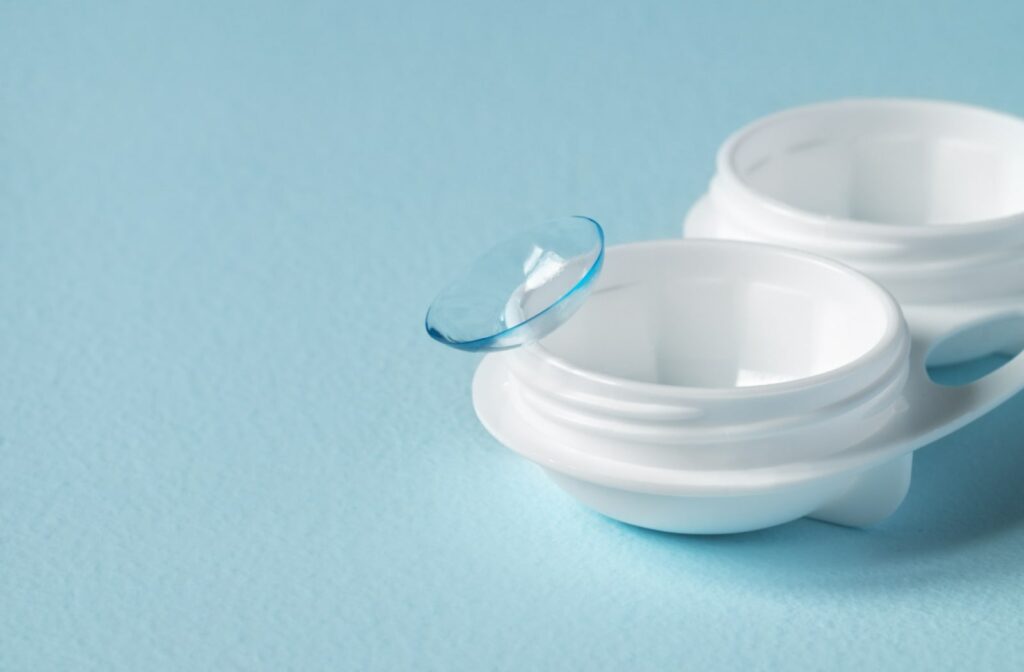Contact lenses are a popular method to correct vision. Whether you use them alongside glasses or wear them daily, contact lenses are just as effective at addressing blurred vision. However, contact lenses require more maintenance than glasses, and their wear instructions need to be closely followed to protect your eyes from unwanted side effects.
Soft contact lenses, the most common type, have strict lifespans to follow depending on the wear schedule set by your optometrist. Visit your optometrist for a contact lens exam and fitting to discuss the best wear schedule for your lifestyle.
Soft Contact Lenses & Gas-Permeable Contact Lenses
The two main styles of contact lenses are soft and rigid-gas permeable (RGP) lenses.
Soft contact lenses, the most popular type of contact lens, are made from a flexible plastic that forms to the surface curve of the eye, the cornea.
RGP lenses, also known as “hard” lenses, are less common but give the wearer sharp vision and may benefit those who have astigmatism or irregular corneas, such as keratoconus.
The differences in these lenses impact their longevity, wear schedule, and expiration date. To avoid wearing contact lenses beyond their expiration date, book an appointment with your optometrist to discuss your questions and get an up-to-date contact lens prescription.
How Long Do Soft Contact Lenses Last?
Soft contact lenses come in three distinct varieties:
- Extended wear disposables
- Daily wear disposables
- Daily disposables
Extended-wear contact lenses are designed for overnight or continuous wear for up to 30 days. Following each scheduled removal, your eyes need a rest between inserting a fresh set, and your optometrist will offer time parameters to follow for your eye health.
Daily wear lenses are only designed to be worn during the day. Sleeping or napping in these lenses leads to discomfort in your eyes. A single pair can last from 2 weeks to a month, depending on the type and material of the contact lenses.
Daily disposable lenses are simple. These low-maintenance lenses need no cleaning or storage in a contact lens case, which can limit the chance of infection. You insert a new pair every day, and when you take them out at night, you dispose of them immediately.
How Long Do Rigid-Gas Permeable Contact Lenses Last?
RGP lenses are made from lightweight, flexible plastic, though more firm than soft lenses. RGP lenses are known for their durability, and a single pair can last up to 2 or 3 years with proper care – most are replaced yearly due to scratches on the lens surface during normal handling of the lenses.
These durable contact lenses may last longer than the length of stability of your refraction, i.e., your contact lens prescription. If you notice changes in your vision and require an updated prescription, you may need to replace your RGP lenses sooner.
Can You Wear Expired Contact Lenses?
Contact lenses are medical devices and only last a specific amount of time, as determined by the manufacturer and the FDA. Wearing contact lenses past expiration or wearing them too long beyond recommended may cause damage to your eyes.
Good contact lens practices help maintain eye health, so following wear schedules and tracking expiration dates is crucial.
Wearing contact lenses beyond the appropriate amount of time can put you at a higher risk of developing keratitis. Keratitis is inflammation of the cornea. Microbial keratitis can occur through improper contact lens care, wearing contacts for too long, or wearing expired lenses.
Germs such as viruses, bacteria, parasites, or fungi can enter the eyes, infect the cornea, and cause dangerous complications for your eye health.
Common symptoms of an eye infection may include:
- Red eyes
- Irritation of the eyes
- Progressively worsening pain in or around the eyes
- Sensitivity to light
- Sudden blurry vision
- Discharge or overwatering of the eyes
Eye infections can be prevented by practicing healthy contact lens care. If you need a review of tips to care for your lenses, our team can help.
How to Care for Contact Lenses
Over 45 million Americans wear contact lenses, and all must follow healthy habits to keep their eyes healthy and vision clear. Your optometrist will give you instructions to follow, recommendations for supplies, and teach you tips for hygienic contact lens care. Some of these instructions may include:
- Wear your contacts only for the length of time recommended by your optometrist
- Wash your hands and dry them with a clean cloth before and after handling your contact lenses
- Don’t sleep while wearing your contact lenses
- Rub and rinse your contact lenses with solution to remove dust and debris
- Keep your contact lenses away from water
- Always use fresh contact solution
- Replace your contact case at least once every three months
- Maintain your comprehensive eye exam schedule
During your annual eye exam, discuss any contact lens concerns and contact your optometrist – if you experience pain, redness, or blurred vision when wearing your contact lenses you may need to come in sooner than later.
Keep Your Contact Lenses Up to Date
Ensure your contact lenses are always fresh and up to date by scheduling an eye exam to review your contact lens care and assess your eye health.



